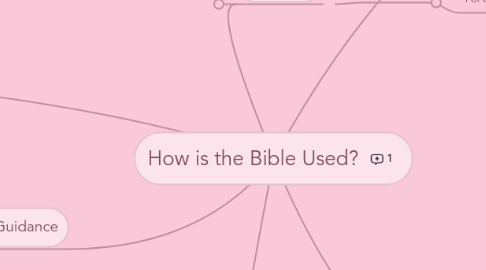
1. Evangelise
1.1. Alpha Course
1.1.1. Bring more people into the church, asking questions
1.2. Missionary Work
1.2.1. Inspire you to do the work
1.2.2. Used in work
2. Education
2.1. Academic Study
2.1.1. For devotional Reasons
2.1.2. For academic reasons (students)
3. Moral Guidance
3.1. How to live your life
3.2. Gives strength, guidance or encouragement
3.2.1. E.g Gideon's Bible
4. Publicly by Christians
4.1. Formal
4.1.1. The Revised common lectionary
4.1.1.1. Advantages
4.1.1.1.1. Disciplines worship leaders to use wider range of biblical texts, rather than just ones they are comfortable with.
4.1.1.1.2. Allows for ecumenical movement
4.1.1.1.3. Helps worship leaders make connections between biblical texts
4.1.1.2. Disadvantages
4.1.1.2.1. Restrict worship leaders, cannot respond to news and current affairs.
4.1.1.2.2. Worship leaders and congregations may be guided towards particular interpretations of text by placing certain texts together.
4.1.1.2.3. Doesn't include the whole Bible
4.1.2. Expository Preaching
4.1.2.1. "Expository preaching is structured, discourse, direct, reflective, and concretely applied.
4.1.2.2. It is the breakdown of passages, putting it into context and explaining passages to the congregation.
4.1.2.3. It is regularly designed to challenge people's current beliefs and attitudes.
4.1.2.4. Importance
4.1.2.4.1. Whatever your world view you will translate and see things in that way. SL: RM. Hare "People have bliks"
4.1.2.4.2. Dangerous to see the Bible through only your own eyes
4.2. Informal
4.2.1. Youth +Bible Study
4.2.2. Spontaneous Speaking/ preaching
4.2.3. Evangelism
4.2.3.1. Street preaching
4.2.4. Proclaiming it
4.2.4.1. Being overcome by the holy spirit
4.2.4.2. In testimony
4.2.5. Missionary Work
4.2.5.1. Putting faith into action
5. Worship
5.1. Sermon
5.1.1. Lectionary
5.1.1.1. Set Reading
5.1.2. Pulpit
5.1.2.1. Preaching
5.2. Private Devotional Reading
5.3. Group Study/Bible Study
5.4. to create hymns
5.5. To create Prayer
5.5.1. The lords Prayer is directly from scripture
5.6. Liturgy, pattern of the service
5.6.1. Used in Baptisms, weddings, funeral, confirmation
5.6.2. Right of Passage
5.7. Eucharist (Thanksgiving)
5.8. Advertising
5.8.1. Used to encourage worship and evangelise
5.9. Sunday School
6. Privately by Christians
6.1. Private use of the lector divina
6.2. Commentaries
6.2.1. To use as guidance when studying the Bible alone.
6.2.2. Disadvantages
6.2.2.1. Coming to the Bible without any preconceptions, makes sure no one else opinions are influening
6.2.2.1.1. You are making sure it is speaking to YOU
6.2.3. Advantages
6.2.3.1. Stops us using your blik
6.2.3.1.1. The language we reading is meaningful to us as we see it through our own spiritual understanding
6.2.3.2. May challenge your views
6.2.3.2.1. Helps you to see alternative views
6.2.3.3. Might make understanding deeper and more meaningful. Contextualising it.
6.2.4. "Commentaries should be used to support rather than direct our own interrpatiivte investigation" - Holgate & Starr
6.3. Immediate reassurance or guidance
6.4. Private study in tune with lectionary
6.5. Contemplation, Prayer, Meditation
6.6. Ethical Guidance
6.6.1. How to live your life.
6.7. Keeping in touch with God
6.7.1. Keeping your relationship living
6.8. Inspire creativity
6.8.1. i.e. Artists, Musicians
